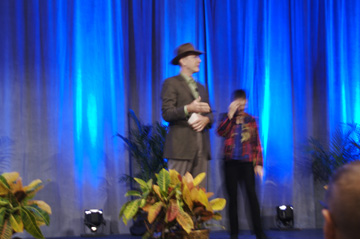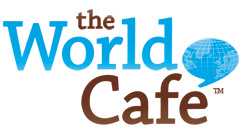
In the afternoon weaving Bard Hurley gave us a metaphor for what he sensed “in the field”, a beautiful image from James Mitchner about a slow accumulation, a melding of meaning like individual droplets of dew gathering together to create a river. We were invited to take a moment and reflect on the intention that had brought us each here, and then share with each other what had been meaningful in relation to that intention so far.
In my small group a bishop form NJ shared his intention as a wish to experience a “moment of light”.
***
Otto Scharmer jumped right into the “Theory U and the Blind Spot of Leadership”, which offers a lens that sheds light onto a blind spot in our understanding of leadership – the crucial importance of the leader’s interior condition.
For example, as a painter you could have a completed painting, which is the “result”. It came into being through the process of painting, which is the “how”, but at the source you have the blank canvas, the moment of origin, the blind spot where you are present with the creative process.
He illustrated this moment of origin in an amazing bit of footage taken of the great operatic tenor Placido Domingo and a virtuoso conductor whose name I didn’t catch. In this film, there is a moment where the conductor and Domingo become one. The whole room felt it like a thrill, a surge of electricity, and when it was over Otto asked us to describe what they’d seen. Here are a couple of the responses: “I saw them touching the divine, becoming one”, “an opening – one moment manifesting through two people.”
Otto pointed to this moment of presence between the conductor to the tenor as an example of a shift in leadership – at times like this a crack appears, he says, and there is a choice – to let the ego get out of the way and hold the space for something else to emerge, or to try and control the space and bring it “back on track”.
When the ego can get out of the way, perception begins to extend to the whole. It shifts from the inside to the outside in an empathic listening, where feelings are organs of perception and boundaries break down. All the attention is focused on the emergent. You step back and create an empty space where others can step in and something new can emerge from the “pregnant” aspect of the now.
He described four types of listening – in the first, of old patterns, the person is situated inside themselves. In the second, the move to the edge of themselves and begin to see possibilities. The third is empathic listening, where the focus is outside oneself, in another. In the fourth mode of listening you are listening from the emergent, simultaneously focused inside yourself and in everything around you, shifting the place from which you operate and staying with the moment of stillness at the moment of presence.
The slidehow that illustrated his talk shows his theory of two sources of learning and learning cycles, and two cognitions: [Download Otto_Scharmer.ppt (561.0K)]
Presencing, Otto says, is “sensing” and beginning to operate from that place in the now. The future shows up in our heart first. The mind can only see what has happened in the past; to connect with the future we have to activate a new source of learning – the heart.
He points out that when you are connected to source in this way, your “hands know what to do”, and that conversely, you need to embody something in order to really learn it. If you always let someone else take the lead, like the prevailing ‘expert mode’ encourages, you never learn how to lead yourself. So, he advises, get out of the institutional bubble, connect with what really matters to you, and do it!
The ultimate “open will” stage of the “U” is operating in harmony with what is around you. Each of us is two selves, he says, the small self and the Self – who we can become in the future. Presencing is these two selves connecting and beginning to act together.
***
To continue chronologically and read about Monday evening’s dinner with our book translation colleagues from Asia, click here.



0 Comments